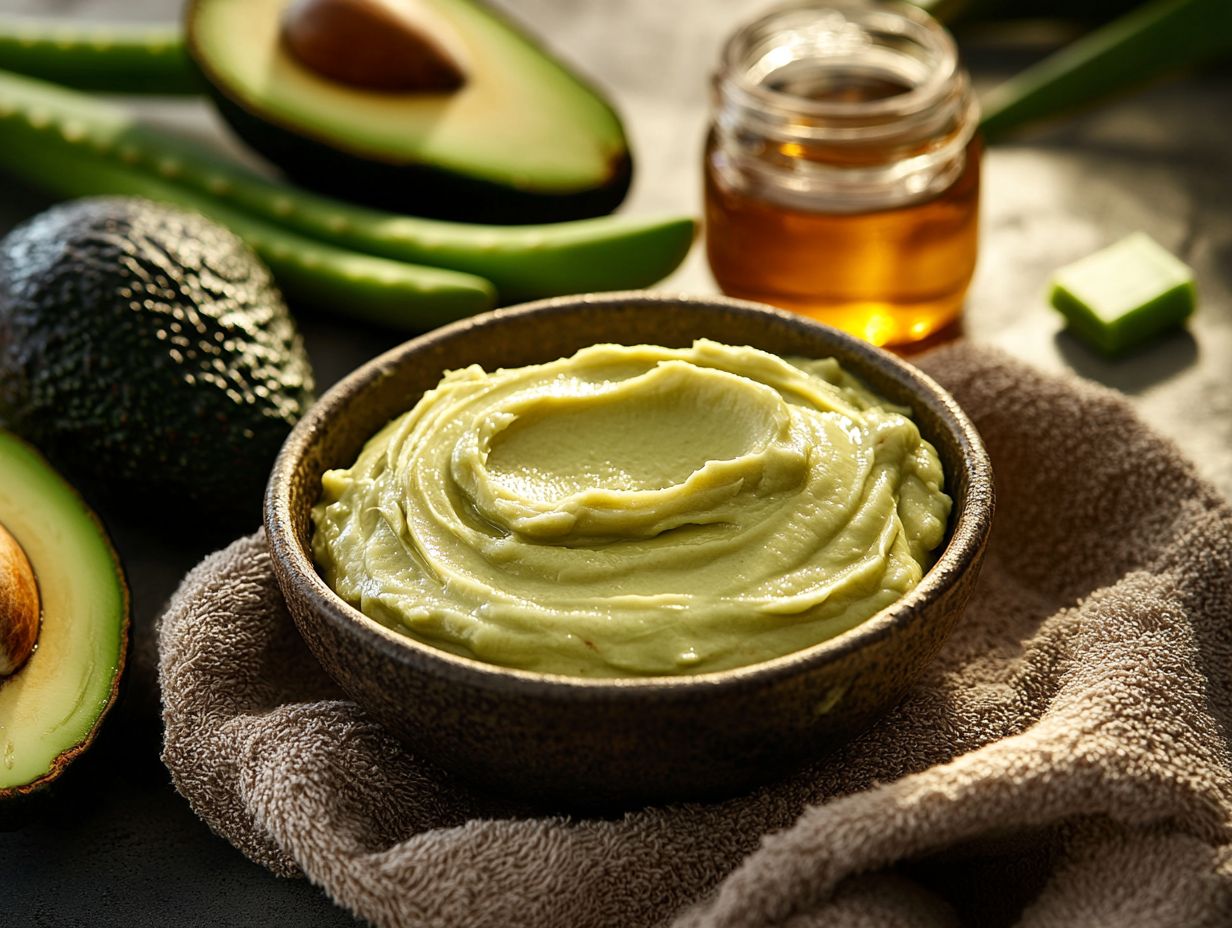Struggling with dry and damaged hair can feel like an endless battle, but the good news is that you’re not alone—and there’s a solution!
This article explores the causes and symptoms of hair damage, highlighting the benefits of DIY hair masks made from natural ingredients.
You’ll discover easy recipes to whip up nourishing masks at home, along with tips on application and removal.
Learn how to adopt healthy habits that keep your hair vibrant and strong.
Say goodbye to bad hair days!
Key Takeaways:

- Dry and damaged hair can be caused by various factors and can lead to symptoms like split ends and frizz.
- DIY hair masks can be highly beneficial due to their use of natural ingredients and ability to be customized for individual hair needs.
- Some popular and effective DIY hair mask recipes include avocado and honey, coconut oil and banana, and egg and olive oil masks.
Understanding Dry and Damaged Hair
Comprehending the characteristics of dry and damaged hair is essential for effective care and treatment. Several factors, including environmental conditions, inadequate hair care routines, and the application of harsh products, can lead to hair becoming dry and brittle.
Such conditions may result in split ends, breakage, and an overall lackluster appearance. Additionally, maintaining scalp health is critical, as it directly affects hair growth and vitality.
Identifying these symptoms and underlying causes can facilitate the development of more effective solutions, including the use of DIY hair masks composed of natural ingredients aimed at restoring the hair’s natural shine and strength.
Causes and Symptoms
The causes of dry and damaged hair can be attributed to various environmental and lifestyle factors, which often present specific symptoms.
Prolonged exposure to sunlight and environmental pollutants can deplete the hair of its natural moisture, resulting in a lack of hydration that adversely affects its overall vitality. The use of harsh products containing sulfates or alcohol may further aggravate the condition, leaving the hair appearing dull and lifeless.
Common indicators of this damage include brittleness, split ends, and a noticeable reduction in shine, which can be concerning for individuals mindful of their hair’s appearance. For solutions, consider exploring DIY Hair Masks for Dry and Damaged Hair. Additionally, maintaining scalp health is crucial; a neglected scalp can contribute to dryness and worsen existing hair-related issues.
Benefits of Using DIY Hair Masks

Utilizing DIY hair masks presents numerous advantages for both scalp health and hair growth, serving as a natural alternative to commercial products. These masks effectively nourish the hair follicles while addressing specific concerns such as dryness and brittleness.
By incorporating wholesome ingredients such as avocado, honey, and essential oils, individuals can furnish their hair with the vital nutrients it requires. This approach not only enhances the overall texture and shine of the hair but also promotes healthier growth and revitalizes the scalp.
Consequently, DIY hair masks constitute a valuable enhancement to any hair care regimen.
Natural Ingredients and Customization
Natural ingredients serve as the foundation for effective DIY hair masks, enabling customized solutions that cater to individual hair types and preferences.
These versatile components, including creamy avocado, soothing honey, and aromatic essential oils, can address a variety of concerns ranging from dryness to brittleness. For example, a hair mask composed of ripe avocado and honey not only provides hydration but also enhances shine, making it particularly suitable for individuals with dull, dry hair.
Additionally, incorporating a few drops of nourishing jojoba essential oil can improve moisture retention. Another beneficial formulation may include a mixture of coconut oil and aloe vera, which is particularly effective in combating frizz and strengthening hair strands.
By combining these natural ingredients, individuals can formulate unique treatments that specifically target their hair concerns, resulting in healthier-looking hair.
DIY Hair Mask Recipes
Developing your own DIY hair masks enables you to harness the benefits of natural ingredients such as avocado, honey, and coconut oil, providing customized treatments to meet your hair’s specific needs.
Each formulation can target particular concerns, whether it involves moisturizing dry hair, repairing damage, or enhancing shine. For example, an avocado and honey mask can effectively hydrate, while a banana and coconut oil combination can support hair growth.
These recipes not only contribute to improved hair health but also give the power to individuals to take charge of their hair care regimen.
Moisturizing Avocado and Honey Mask

The moisturizing avocado and honey mask is a widely recognized DIY hair treatment celebrated for its hydrating properties, rendering it particularly effective for dry and brittle hair.
This nourishing combination not only provides essential moisture but also enriches the hair strands with vital vitamins and fatty acids that enhance overall vitality. Avocado, which is abundant in vitamins E and B, revitalizes the scalp and improves hair elasticity, while honey functions as a natural humectant, effectively attracting and retaining moisture.
To prepare this revitalizing mask, one should:
- Mash a ripe avocado.
- Combine it with two tablespoons of raw honey.
- After achieving a smooth consistency, apply the mixture evenly to damp hair, with particular attention given to the ends.
- Allow the mask to remain in place for 30 minutes before rinsing with lukewarm water to achieve optimal results, leading to softer and more manageable hair.
Repairing Coconut Oil and Banana Mask
The coconut oil and banana hair mask is an excellent option for restoring damaged hair and providing deep nourishment.
This combination leverages the moisturizing properties of coconut oil alongside the vitamins and minerals present in bananas, making it a potent ally in achieving healthy hair. Coconut oil penetrates deeply into the hair shaft, effectively sealing in moisture and preventing protein loss, while bananas contribute shine and enhance elasticity, thereby reducing breakage.
To prepare this rejuvenating DIY hair mask, one should mash one ripe banana and mix in two tablespoons of coconut oil until a smooth consistency is achieved. For optimal results, the mask should be applied generously from roots to tips, allowing it to sit for 30 to 45 minutes before rinsing thoroughly. This enriching treatment can be performed weekly to aid in the rejuvenation and restoration of shine to the hair.
Nourishing Egg and Olive Oil Mask
A nourishing egg and olive oil mask can significantly enhance the health of hair by providing a substantial amount of protein and moisture.
This DIY hair mask is highly effective due to the combination of rich proteins found in eggs, which are ideal for strengthening hair, and the deep moisturizing properties of olive oil that help to retain hydration. The fatty acids present in olive oil not only promote hair growth but also impart shine and reduce frizz.
To prepare this nourishing treatment, one should whisk together one egg and two tablespoons of olive oil until the mixture is well blended. The application should be done generously from the roots to the ends, ensuring even coverage. It is recommended to leave the mixture on for approximately 30 minutes before rinsing it out with lukewarm water and a mild shampoo for optimal results.
This straightforward yet effective process can rejuvenate tired strands, resulting in soft, lustrous hair.
Tips for Applying and Removing DIY Hair Masks

The proper application and removal of DIY hair masks is essential for maximizing their benefits and ensuring optimal hair health.
Proper Application Techniques
The proper application techniques are essential for ensuring that a DIY hair mask provides maximum benefits to the hair.
To begin, it is advisable to gently towel dry the hair after washing, removing excess moisture without creating friction that could lead to damage. Once the hair is damp but not dripping, it should be sectioned into manageable parts, allowing for even distribution of the mask.
The mixture should be applied generously, starting at the ends where damage often occurs, and working upwards towards the roots, ensuring that every strand is thoroughly covered for optimal nourishment. It is important to leave the mask on for the recommended duration, as this significantly impacts its effectiveness. Typically, allowing it to sit for at least 20 to 30 minutes enhances absorption, ensuring that the hair receives all the necessary nutrients.
Gentle Removal Methods
Gentle removal methods for DIY hair masks are crucial to prevent damage to the hair while ensuring the full benefits of the treatment are achieved.
When rinsing out a hair mask, the use of lukewarm water is essential, as it aids in softening the product without depleting essential moisture. It is advisable to avoid hot water, as this can exacerbate dryness and lead to hair breakage. Following the rinse, utilizing a mild shampoo can effectively cleanse the hair while preserving its natural oils.
The key to this process is to be gentle; harsh or aggressive treatment can inflict more harm than good. It is important to remember that the primary objective is to nourish the hair, resulting in a soft and manageable texture.
Preventing Dry and Damaged Hair
Preventing dry and damaged hair is far more effective than addressing it after damage has occurred. Adopting healthy hair care practices can significantly enhance the overall quality of hair.
Healthy Hair Care Habits
Establishing healthy hair care habits is essential for preventing dryness and damage while promoting optimal hair growth.
These practices can significantly enhance the overall health of one’s hair. Regular moisturizing not only nourishes the hair but also preserves essential hydration, ensuring it remains supple and vibrant.
It is also important to minimize the use of chemical treatments, as these can compromise hair structure and lead to brittleness over time. Protecting hair from environmental stressors, such as harsh sunlight and pollution, is crucial; employing protective styles or wearing a hat can effectively shield against these damaging elements.
Furthermore, emphasizing a balanced diet rich in nutrients contributes to hair rejuvenation and strength, resulting in a lush and resilient mane.


